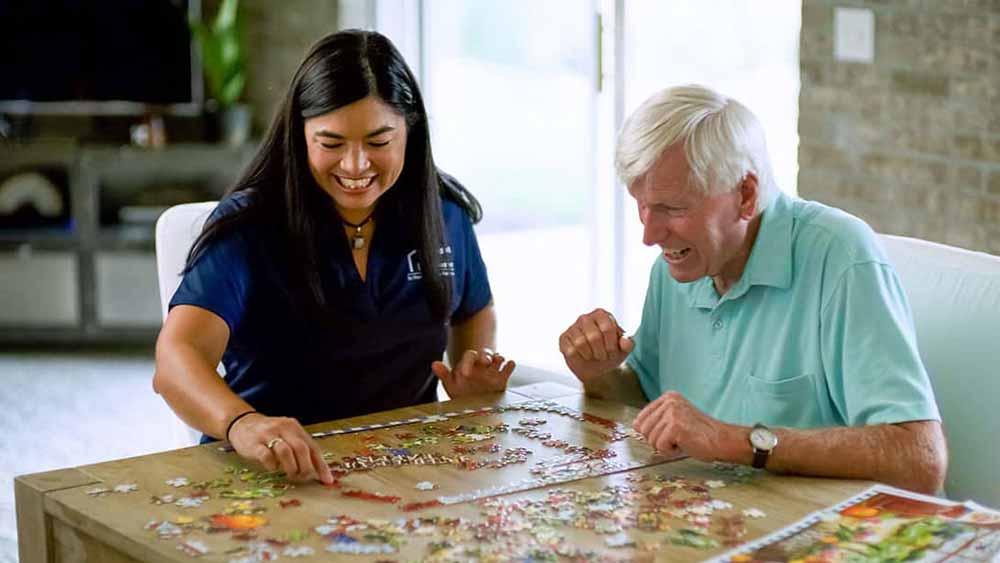

Go Ahead, Watch Another Cat Video!
We often hear about teen computer gamers staying up all night in Mom’s basement—but what about Grandpa in the guest room? Today more older adults are spending a lot of time on the internet. Is that a good thing?
A September 2021 study from the University of Lancaster in the U.K. showed that, in fact, retired older adults who use the internet score much higher on cognitive tests. “Our results reveal that using the internet, post-retirement, leads to a marked reduction in the rate of cognitive decline,” said study co-author Dr. Vincent O’Sullivan. He reports that the protective effect is most significant among retired women, but men who go online also score higher on tests of memory, attention, spatial abilities and problem solving.
Experts say the life milestone of retirement can lead to a reduction of mental stimulation, which is so important for brain health. The University of Lancaster study, which included seniors of diverse education level, age and previous occupation, is strong evidence that internet use is a good replacement for workplace brain exercise.
The last two years certainly have called attention to the vital role of internet access for older adults. During the pandemic, seniors who can go online have been able to stay better connected to their friends, families and the world outside. They can access telehealth appointments, online senior programs and other resources that have migrated online. Gerontology experts around the world deem internet access so important that the theme of the 2021 United Nations International Day of Older Persons was “Digital Equity for All Ages.”
The internet offers so many opportunities for mental stimulation. Older adults might:
Access online news sources and publications. Thousands of news outlets are at their fingertips, in a format that can be adjusted for older eyes.
Watch videos. Experts say that selecting and watching short videos is more interactive and less passive than bingeing a TV series.
Learn a new skill. Many retired seniors are taking online classes or setting up their own learning experience by watching YouTube videos about cooking, woodworking, crafts or home repair.
Play computer games. Many computer games have been found to provide a beneficial mental workout, enhancing spatial sense and memory.
Exercise. Exercise videos, interactive classes, and even active video games provide moderate to vigorous physical activity.
Connect with others. Seniors can join online support groups, interact with people who have similar interests, and participate in neighborhood groups.
Go on virtual visits. Using the Street View in Google Maps, an older adult can “explore” places they once lived or would like to visit.
What about social media?
This aspect of online life deserves special mention. Social media platforms are such a powerful force in our world today that older adults who don’t participate can feel left out. “No one sends a Christmas letter anymore,” said one grandmother. “They already know what everyone is doing from Facebook.”
A 2021 study from the University of Alabama in Huntsville found that a growing number of older adults are using Facebook, Instagram and other platforms. While their top motivation is to supplement in-person interactions, study author Dr. Pavica Sheldon says that many older users also are using social media in ways usually associated with younger users—to document their lives and “show off.”
“This finding about older individuals using visual media to promote themselves was a little surprising to us,” Dr. Sheldon said. She reported on so-called “granfluencers”—older influencers who might have millions of followers.
There are pitfalls with social media, of course. Users might be tempted to compare themselves with others. University of Pennsylvania researchers said, “Some of the existing literature on social media suggests there’s an enormous amount of social comparison that happens. When you look at other people’s lives … it’s easy to conclude that everyone else’s life is cooler or better than yours.” Remember that most people post only the most flattering photos and updates to “curate” their online presence.
Social media users also are vulnerable to emotional contagion when algorithms serve them a diet of inflammatory posts and misinformation, with flame wars not far behind. As Harvard Medical School’s Dr. Srini Pillay says, “Interact with a disgruntled group online, and you are likely to feel disgruntled, as well.”
Ways family can help
Even retirees who have good digital skills can be frustrated by constant upgrades and tech glitches. Volunteer to serve as your loved one’s tech support if you’re able, or recruit another tech-savvy family member. Here are things to do:
Optimize your loved one’s equipment. Help them choose the right technology for their abilities and needs—not more complicated than is needed, and with appropriate accessible hardware and software features.
Help keep your loved one safe. The International Day of Older Persons proclamation warned that “cybercrimes and misinformation threaten the human rights, privacy and security of older people.” Be sure your loved one’s antivirus software is kept up to date. And since antivirus software can’t ward off all intruders, build awareness and healthy skepticism by making security a topic of conversation.
Join in their web surfing. Exchange links and discuss the content. Ask them to take you on a Google Street View “tour” of their old hometown while they reminisce. Encourage them to interact online with younger family members. Two, three and even four generations can enjoy those cat videos together!
Don’t neglect in-person connections. Online time can never take the place of IRL (in real life) interactions—and it shouldn’t. Depending on safety recommendations, plan more gatherings. Encourage all your guests to put their smartphones away. And remember, people of every age can go down a rabbit hole of misinformation. Experts say the best remedy is in-person conversations with people they know and trust.







